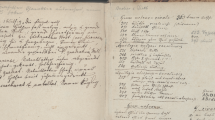Abstract
A CALL to reject in its entirety forty years work in a science which has engaged widespread attention and earned distinction for many, including a Nobel laureate, is both very unusual and very disturbing. Yet this is what Lyssenko and his followers at the Russian Genetical Conference of 1939 would have us do1 ; and, what is still more disturbing, no one other than those directly engaged in genetical research has found it desirable actively to oppose Lyssenko's views. Indeed his allegations have been repeated, and, it would appear, supported, in Great Britain2.
This is a preview of subscription content, access via your institution
Access options
Subscribe to this journal
Receive 51 print issues and online access
$199.00 per year
only $3.90 per issue
Buy this article
- Purchase on Springer Link
- Instant access to full article PDF
Prices may be subject to local taxes which are calculated during checkout
Similar content being viewed by others
References
Reported in "Pod Znamenem Marxisma". Translation available at the offices of the Society for Cultural Relations, 98 Gower Street, London, W.C.2.
'Espinasse, P. G., NATURE, 148, 739 (1941).
Mendel, G. J., Translation in Bateson's "Mendel's Principles of Heredity" (1865).
Nilsson-Ehle, H., "Kreuzunguntersuchungen an Hafer und Weizen" (Lund, 1909).
Emerson, R. A., and East, E. M., Neb. Agric. Exp. Sta. Res. Bull., 2 (1913).
Galton, F., Proc. Roy. Soc., 61, 401 (1897).
Fisher, R. A., Trans. Roy. Soc. Edin., 52, 399 (1918).
Fisher, R. A., Immer, F. R., and Tedin, O., Genetics, 17, 107 (1932).
Johannsen, W., "Elemente der exakten Erblichkeitslehre" (Jena, 1909).
Mather, K., J. Genet., 41, 159 (1941).
Bateson, W., and Punnett, R. C., Rep. Evolution Comm. Roy. Soc., III (1906).
Morgan, T. H., Sturtevant, A. H., Muller, H. J., and Bridges, C. B., "The Mechanism of Mendelian Heredity" (New York, Holt, 1915).
Warren, D. C., Genetics, 9, 41 (1924).
Muller, H. J., Verh. V. int. Kongr. Vererbungsw., 234, Z.I.A.V. suppl. I (1927).
Darlington, C. D., "Recent AdvancesinCytology" (London, Churchill, 1932).
Painter, T. S., Genetics, 19, 175 (1934).
Beadle, G. W., and Ephrussi, B., Proc. U.S. Nat. Acad. Sci., 21, 642 (1935).
Huxley, J. S. (ed.), "The New Systematics" (Clarendon Press, Oxford).
Bateson, W., "Mendel's Principles of Heredity" (Cambridge University Press, 1909).
de Vries, H., "Die Mutationstheorie" (2 vols.) (Leipzig, Veit, 1901–3).
Fisher, R. A., "The Genetical Theory of Natural Selection" (Clarendon Press, Oxford, 1930).
Johannsen, W., Amer. Nat., 45, 129 (1911).
Author information
Authors and Affiliations
Rights and permissions
About this article
Cite this article
MATHER, K. GENETICS AND THE RUSSIAN CONTROVERSY. Nature 149, 427–430 (1942). https://doi.org/10.1038/149427a0
Issue Date:
DOI: https://doi.org/10.1038/149427a0
This article is cited by
-
Recent studies on inheritance of quantitative characters in plants
The Botanical Review (1944)
-
Polygenic Inheritance and the Drosophila Culture
Nature (1942)
Comments
By submitting a comment you agree to abide by our Terms and Community Guidelines. If you find something abusive or that does not comply with our terms or guidelines please flag it as inappropriate.


